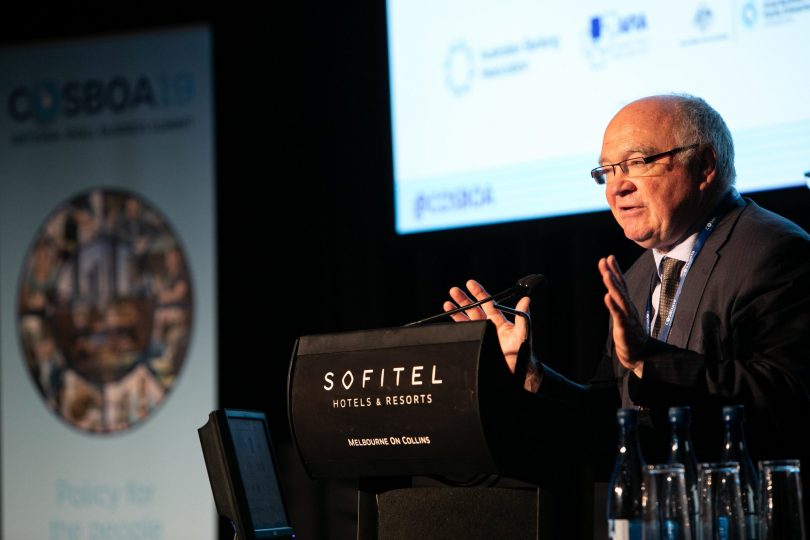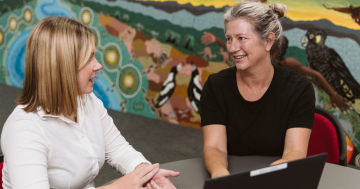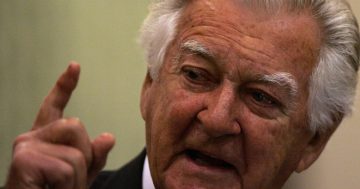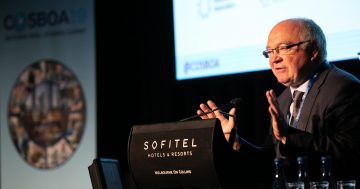
Peter Strong, speaking at the Council of Small Business of Australia 2019 gala. Photo: COSBOA Facebook.
Peter Strong’s family background wouldn’t appear to be a natural fit for a career in small business: his father was an Australian Workers Union executive and he spent a fair bit of his own career in the public service.
But Peter says anyone who focuses on people first and foremost is in the same boat.
“Dad was all about safety – people and their wellbeing,” he says. “When I left school and got married, I ended up in Albury with a thing called the Commonwealth Employment Service and I learned that small business people are amazing.
“They were in every community I worked in, from Inverell to Goulburn and right across the Riverina. They would come into the CES and say, ‘Look, I’ve got this young person I want to put on. They’ve got a bit of an education problem, but I think they’ve got a lot of potential. What can we do?’
“They were just the backbone of communities, often run by families. And I learned that the enemy of small business is big business,” he said. “Unions have their problems but there’s no democracy without unions.
“Big business can just suffocate small business and often the government doesn’t help at all.”
Peter found himself in a policy position in Canberra during the Hawke/Keating market reforms, prompting him to move into community empowerment during a time of change.
He realised that all too often, centralised decision-making was operating against the interests of small business people.
That fired what’s now a lifelong mission to give small businesses a say, advocate for their interests and empower them to fight red tape and mindless lawmaking.
“We’ve got to stop thinking that a small number of people in some central office can solve everything and I’m not just talking government, I am talking some unions. I’m talking some industry associations,” Peter says.
“This isn’t just attacking government. This is about a whole range of things about attitude and understanding community. Years ago, I got to know Sandy Chong, head of the hairdressing council, and I understood it was about so much more than just a business.
“It’s young girls coming there for their formal rite of passage, it’s seen as a safe place by women in domestic violence situations. It is a place where a lot of women go when they’re feeling down depressed … It is more than a business, more than an economic unit.”
Peter spent some time working in both the former Soviet Union and China, coming away with the view that we’ve got many things right in Australia, including our ability to challenge authority.
It’s an attitude he took with him over 10 years as CEO of the Council of Small Business of Australia (COSBOA). He’s always been a visible presence: many would recall his Red Tape Nation rap, protesting the burdens small business owners face.
Peter is adamant that advocacy can’t be partisan and that no one political party has a lock on the small business vote.
He’s seen the ugly face of political interference and it makes him uncomfortable: much better, he says, to call a spade a spade when it’s necessary than to cozy up to one side or the other.
“I support good government, good policy, transparency. That’s what I support. And that’s what small business people support,” he says.
Peter has stepped down from the COSBOA role and is now an independent consultant, although he continues to appear on The Drum on ABC News 24 and to write for a number of national outlets.
He thinks small business in Canberra still isn’t being heard, and while the long-term Labor Government is essentially pro-growth and development, Peter thinks they’re often ignorant of the effect their decisions have on the small business community.
Peter will be writing a regular fortnightly column for Region and he’d like to hear from anyone battling red tape, so he can continue the fight for transparency and accountability.





















